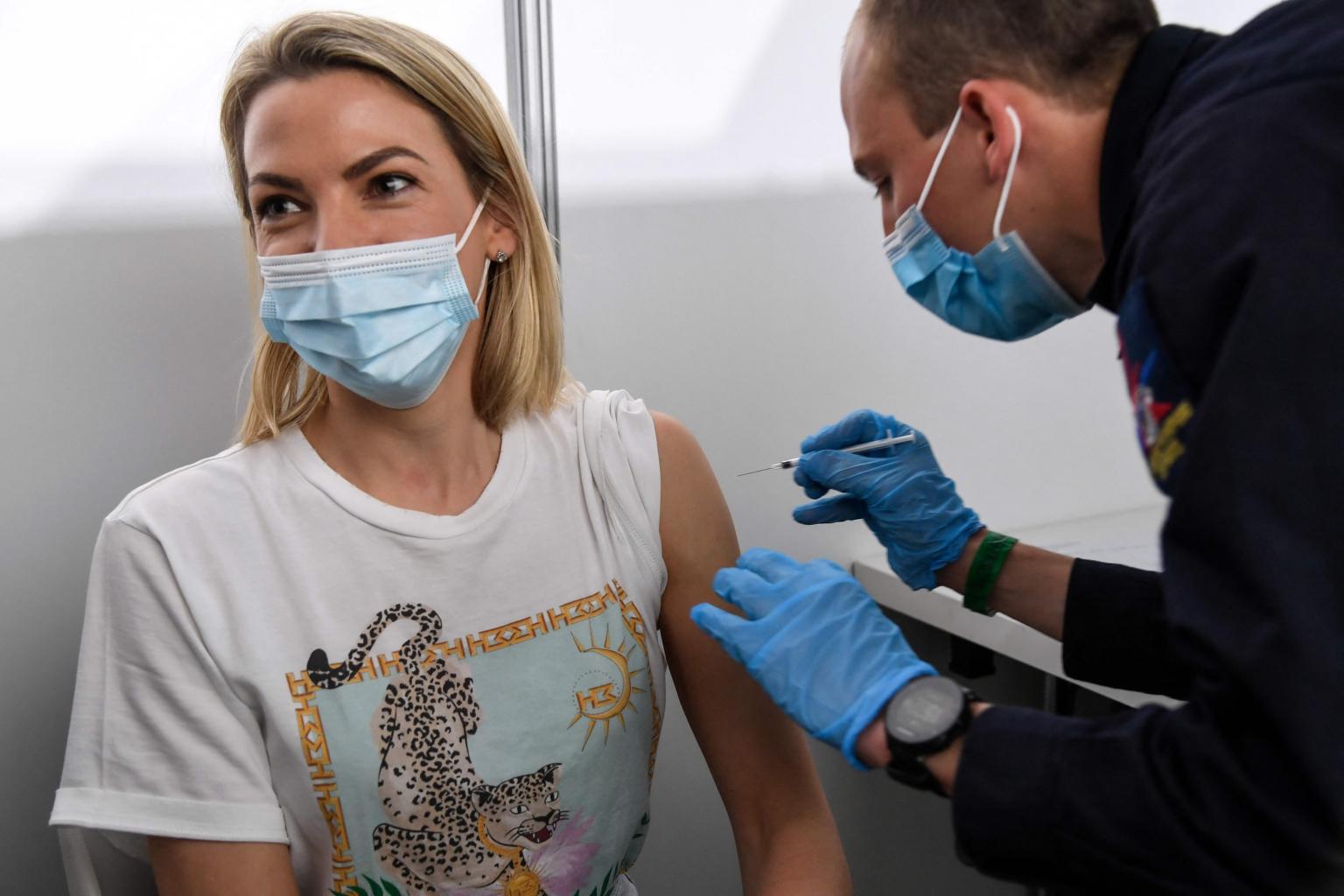Several countries delaying second Covid-19 vaccine dose
Sign up now: Get ST's newsletters delivered to your inbox

A longer interval between the first and second shots can free up resources to administer the first dose to more people.
PHOTO: AFP
SINGAPORE - A number of countries around the world have opted to delay dispensing the second dose of the Covid-19 vaccine as they rush to offer protection to more people as early as possible.
A longer interval between shots has not been tested in clinical trials, but some scientists said the move to delay was sensible, given the emergence of several highly transmissible variants of the coronavirus.
The recommendation for the second dose varies among vaccines, from as early as 21 days and up to 12 weeks apart.
"You'll save far, far more lives - on the order of tens of thousands more lives - giving those extra vaccine doses to people for their first shot, getting them from zero to 85 per cent protected, than using that same capacity (for) giving people their second shot and getting them from 85 to 95 (per cent efficacy)," Dr Robert Wachter, from the University of California's Department of Medicine, told bi-weekly magazine Science News.
In January, Britain was among the first to take what was then considered an unusual step to delay the second dose of the vaccine by up to 12 weeks to prioritise first jabs to as many people as possible. The country is dispensing three types of vaccines - Pfizer, Moderna and home-grown AstraZeneca.
The move followed a spike in cases in December last year and in January this year, driven mostly by the B117 variant.
That policy resulted in Britain being "one of the countries with the highest vaccine uptake rates in the world", said Vaccines Minister Nadhim Zahawi.
Almost 36 million people have had their first dose, and 20 million among them have had the second.
This has allowed Britain to ease its restrictions from Monday (May 17), allowing indoor dining to return in pubs, cafes and restaurants, while cinemas, museums and sports venues were reopened for the first time in months.
Following on the heels of Britain, Denmark in April approved a delay of up to six weeks between the first and second shots of its Pfizer and Moderna vaccines.
Increasing the gap between the doses means that more people will receive their first dose sooner, providing for wider immunity in the Danish population, the Danish Health Authority said.
However, it also cautioned that the original interval of three to four weeks should be followed whenever possible.
Neighbouring Norway followed suit, extending the interval between the first and second doses of its Pfizer and Moderna vaccines from six to 12 weeks for adults under 65 years old.
The Institute of Public Health and health ministry said the decision would allow all adults to receive their first jabs by July 25, up from the previous estimate of Aug 29.
"Increasing the interval will allow many more to be vaccinated earlier. This will prevent serious illness and death, and reduce the overall level of infection in society," Health Minister Bent Hoeie was quoted as saying.
In France, the authorities have delayed the second jab from four weeks to six weeks since Friday to speed up its inoculation campaign.
"(It) will allow us to vaccinate more quickly without reducing protection," Health Minister Olivier Veran told the JDD newspaper.
In the United States, the Centres for Disease Control and Prevention updated its guidance to allow up to 42 days between doses of the Pfizer and Moderna vaccines, to make it more flexible for people to get their second shots.
Canada's National Advisory Committee on Immunisation (Naci) released a guidance in March that allowed provinces to extend the time between first and second doses to a maximum of four months - if vaccines are in short supply.
"The important thing that we've learnt is that these vaccines work, they give a very high level of protection and that protection lasts for many months," Yahoo News Canada quoted Dr Bonnie Henry, British Columbia health officer, as saying.
"Extending this second dose provides very high, real-world protection to more people sooner," she added.
Canada has been hit by a third wave of the pandemic, compounded by a slow vaccine roll-out due to supply issues and shipment delays. Many provinces remain in extended lockdowns even as the country ramped up its vaccination campaign.
Not all experts, however, are convinced about the need to delay the second dose, worried that the presence of partially immunised people could fuel more dangerous variants.
"The virus is going to evolve in response to antibodies, irrespective of how we administer vaccines," Dr Paul Bieniasz, a retrovirologist at Rockefeller University, was quoted as saying by Scientific American magazine. "The question is: Would we be accelerating that evolution by creating country-size populations of individuals with partial immunity?"


